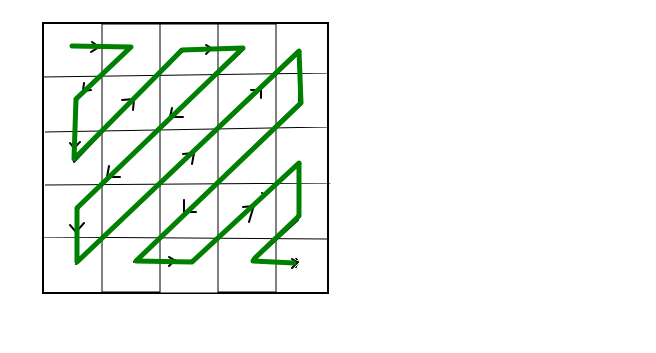C++程序 按Zig-Zag的方式打印矩阵
给定一个n行m列的2D数组矩阵。按照图中所示的ZIG-ZAG方式打印此矩阵。

示例:
输入:
1 2 3
4 5 6
7 8 9
输出:
1 2 4 7 5 3 6 8 9
C++代码的方法
方法很简单。只需按顺序迭代每个对角线元素并根据前一个匹配项更改方向即可。
/* C++ Program to print matrix in Zig-zag pattern*/
#include <iostream>
using namespace std;
#define C 3
// Utility function to print matrix
// in zig-zag form
void zigZagMatrix(int arr[][C], int n, int m)
{
int row = 0, col = 0;
// Boolean variable that will true if we
// need to increment 'row' value otherwise
// false- if increment 'col' value
bool row_inc = 0;
// Print matrix of lower half zig-zag pattern
int mn = min(m, n);
for (int len = 1; len <= mn; ++len) {
for (int i = 0; i < len; ++i) {
cout << arr[row][col] << " ";
if (i + 1 == len)
break;
// If row_increment value is true
// increment row and decrement col
// else decrement row and increment
// col
if (row_inc)
++row, --col;
else
--row, ++col;
}
if (len == mn)
break;
// Update row or col value according
// to the last increment
if (row_inc)
++row, row_inc = false;
else
++col, row_inc = true;
}
// Update the indexes of row and col variable
if (row == 0) {
if (col == m - 1)
++row;
else
++col;
row_inc = 1;
}
else {
if (row == n - 1)
++col;
else
++row;
row_inc = 0;
}
// Print the next half zig-zag pattern
int MAX = max(m, n) - 1;
for (int len, diag = MAX; diag > 0; --diag) {
if (diag > mn)
len = mn;
else
len = diag;
for (int i = 0; i < len; ++i) {
cout << arr[row][col] << " ";
if (i + 1 == len)
break;
// Update row or col value according
// to the last increment
if (row_inc)
++row, --col;
else
++col, --row;
}
// Update the indexes of row and col variable
if (row == 0 || col == m - 1) {
if (col == m - 1)
++row;
else
++col;
row_inc = true;
}
else if (col == 0 || row == n - 1) {
if (row == n - 1)
++col;
else
++row;
row_inc = false;
}
}
}
// Driver code
int main()
{
int matrix[][3] = { { 1, 2, 3 },
{ 4, 5, 6 },
{ 7, 8, 9 } };
zigZagMatrix(matrix, 3, 3);
return 0;
}
输出:
1 2 4 7 5 3 6 8 9
时间复杂度: O(n*m)
辅助空间: O(1)
 极客教程
极客教程